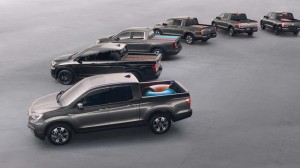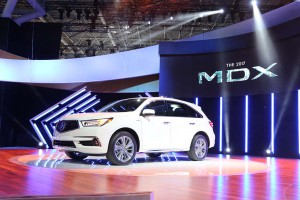When it first began rolling into the U.S. market nearly five decades, Honda put the emphasis on pint-sized products like the 600 minicar. The brand was barely noticed by American motorists until the twin oil shocks of the 1970s put fuel economy high on the priority list.
A new series of ads Honda is launching this week shows how much times have changed once again. Dubbed the “Power of Ridgeline,” the campaign focuses on Honda’s recently relaunched midsize pickup. While Honda continues to offer American buyers downsized models like the Fit, HR-V and Civic, it has reason to be focusing on the truck side of its line-up.
Overall, American Honda reported a 4.4% increase in sales for July, running ahead of a U.S. market that some fear is beginning to slow down after six years of rapid growth. But that only tells a part of the story, for it was the truck side of the line-up that propelled Honda’s strong showing last month, models like the Ridgeline, CR-V and Pilot up 12.2% year-over-year.
By comparison, Honda’s passenger car models were up just 0.4% last month. And their share of the maker’s overall U.S. volume continued to tumble, to just 50.8% in July.
If anything, Honda is actually behind the curve, John Mendel, the maker’s top U.S. executive, told TheDetroitBureau.com during a preview of the Ridgeline earlier this year. Light trucks – a somewhat squishy term that takes in not just pickups and body-on-frame sport-utility vehicles but also crossover utes and vans – are currently running about 60% of the U.S. new vehicle market.
(Truck sales help Honda’s quarterly earnings. Click Here for the report.)
The trend is so significant that Fiat Chrysler Automobiles is ending U.S. production of passenger cars. It last week announced plans to invest $1.5 billion into the suburban Detroit plant that has been making its Chrysler 200 model, converting that factory to handle the Ram pickup. Meanwhile, Alan Batey, the president of GM North America, has suggested that the U.S. market would actually regain momentum if manufacturers could just ramp up overstretched truck assembly lines.
Honda clearly agrees, and it has also been taking steps to bolster its own truck-side operations. The return of the Ridgeline is one of those moves. The original model broke ground by adopting a car-like unibody platform, rather than classic body-on-frame design. The 2017 Ridgeline sticks with that formula but has gotten a more truck-like exterior design and improved performance and cargo numbers.
(U.S. car sales sputter slightly in July. For more, Click Here.)
Initial reviews have been solid, and the Honda truck has been buoyed by the broader revival of the midsize pickup segment after years of decline.
Virtually every light truck model in the Honda line-up had a good month. The little HR-V was up 25.1% compared to a year ago, the bigger CR-V gaining 13.3%. The rare exception was on the Acura side, where the flagship MDX utility vehicle saw a 1.5% decline in July sales, but officials downplay that as an aberration, noting an updated version of the Acura MDX was launched just the month before, pointing to early supply issues. That snafu could be resolved by the time August sales numbers are released.
As more Acura MDX utes and Honda Ridgeline pickups roll into showrooms, the Japanese maker may soon reach the point where trucks cross the threshold to become more than half of overall American Honda sales. That said, without the addition of a full-size pickup and other models to flesh out the line-up, Mendel has said it is unlikely the maker’s car/truck mix will ever reflect the overall shift in the American market.
(Some analysts think that U.S. auto sales have hit their peak. Click Here for the reasons.)



